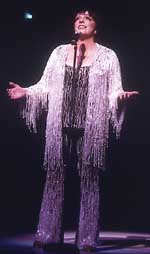
On nobody’s shoulders has celebrity weighed more heavily than on Liza Minnelli’s. Trying to live up to two famous and gifted parents with your own rather modest endowments is no easy task, and having to watch your mother going to pieces must also take its toll. In paying tribute to her father via the music in his films, Liza, with Minnelli on Minnelli, is also seeking redemption for herself. She is a performer whose chief diet is audience adulation, and what is partly a tribute to Dad’s movies is also partly Daughter’s comeback from alcoholism, overweight, and an overlong absence from regular performing.
Undeniably, someone or something fills up the Palace stage. It is not so much the now chubby Betty Boop face, the tubby torso that Bob Mackie’s artful, and sometimes even tasteful, costumes toil to disguise. Nor is it the voice, although it can still, despite some frayed edges, belt out a song punchily, even if dentures (?) put an extra h after the s’s and an extra y after the t’s. It is certainly not the dancing, done mostly by a clutch of agile chorus boys who sometimes, in one of showbiz’s oldest tricks, wheel Liza about on a chair with casters, which here takes on symbolic dimensions.
What is patently, pleadingly, hungrily on view at the Palace is a giant Need that handily earns a capital N. This Need cries “LOVE ME!” from all its wide-open pores, sneaks an entwined sob and laugh into every spoken word, is a huge vacuum cleaner sucking up every sliver of adoration the audience lets drop. It is an epic, an epochal Need that lets this petite waif out-orphan all Annies, out-hunger all Oliver Twists. It is too big even for a Vincente Minnelli movie, and clamors for D. W. Griffith. It has inherited all the wrong things: Vincente’s looks and voice, Judy’s judgment and self-control; yet, quavering but undaunted, it can swallow an entire vast auditorium and still remain unglutted, needy.
Although John Arnone’s scenery is routine stuff, Howell Binkley’s lighting doubles heroically as sculpture and architecture, and several wizards have contributed musical, vocal, and dance arrangements. You will not leave without feeling something, though whether it is admiration, compassion, embarrassment, or sadness is very hard to assess.